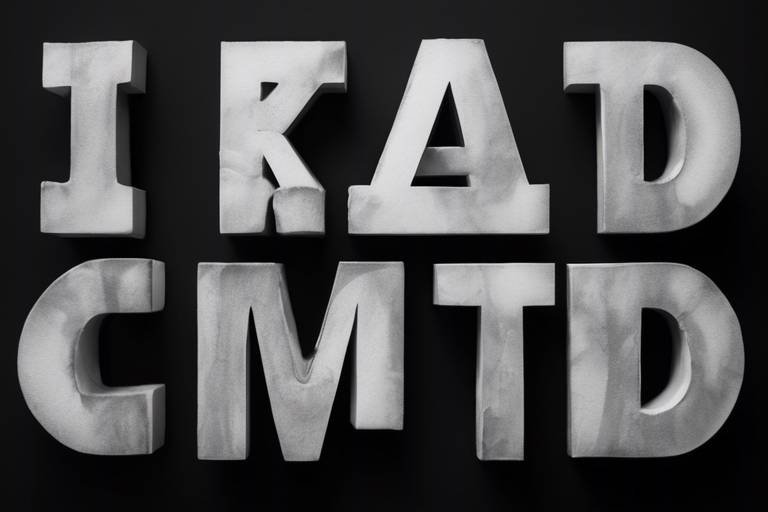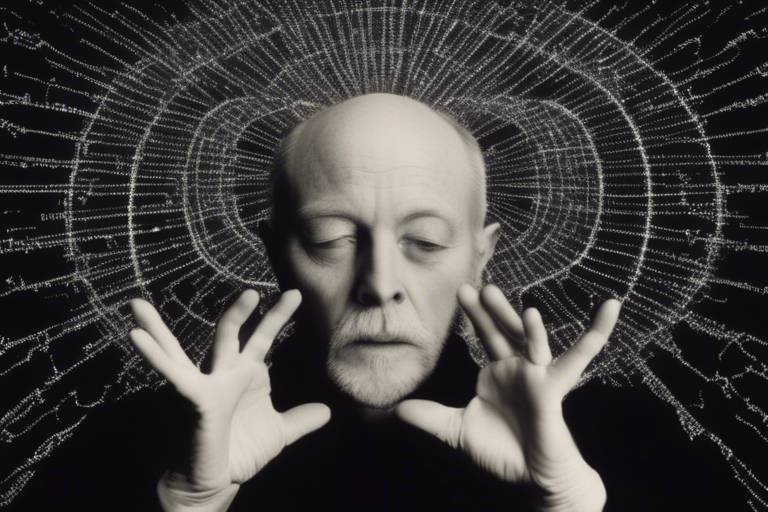What Does Ontology Say About Human Existence?
Ontology, at its core, is the philosophical study of being and existence. It dives deep into the essence of what it means to be, challenging us to reflect on our own existence and the nature of reality itself. When we ponder the question of our existence, we often find ourselves grappling with profound inquiries: What does it mean to be alive?, What constitutes our identity?, and How do we fit into the grand tapestry of the universe? These questions aren't just academic; they resonate with our everyday experiences and shape our understanding of ourselves and the world around us.
As we embark on this exploration of ontology, we will unravel the intricate threads that connect being, identity, and reality. The implications of these concepts extend far beyond philosophical discourse; they influence our personal lives, our relationships, and our ethical considerations. By examining ontology, we can better grasp the complexities of human existence and the factors that contribute to our unique identities.
Imagine for a moment that you are standing in front of a vast, intricate web. Each strand represents a different aspect of existence—our thoughts, emotions, relationships, and experiences. Ontology invites us to examine this web closely, encouraging us to ask: How do these strands interconnect? What does it mean for us to exist at this very moment in time? By engaging with these questions, we can begin to unravel the mysteries of our own existence.
Throughout this article, we will delve into various subtopics that illuminate the intricate relationship between ontology and human existence. From the fundamental nature of being to the ethical implications of our ontological beliefs, we will explore how these concepts shape our understanding of identity and reality. So, let’s embark on this philosophical journey together, as we seek to uncover what ontology reveals about the essence of being human.
What does it truly mean to exist? This question lies at the heart of ontology. The nature of being encompasses a wide array of concepts, from the physical to the metaphysical. In this section, we will explore how these ideas shape our understanding of reality and our place within it. At its most basic level, being refers to the state of existence; it is the condition of having presence in the world. However, ontology challenges us to look beyond mere existence and consider the qualities and characteristics that define our being.
Consider the various dimensions of existence: we are not just physical bodies walking through space; we are also conscious beings with thoughts, emotions, and experiences. This duality of existence raises intriguing questions about the nature of reality. Is reality solely what we can perceive with our senses, or is there more to it than meets the eye? Ontological inquiry encourages us to explore these questions, inviting us to reflect on the deeper implications of our existence.
Our understanding of existence is intricately tied to our sense of self. In this section, we will explore how ontology influences personal identity and individuality. The way we perceive our existence not only shapes our self-concept but also affects our interactions with others. When we consider questions of identity, we often confront the idea of what makes us unique. Is it our experiences, our memories, or perhaps our connections to others? Ontology suggests that our identity is a complex interplay of these factors, each contributing to the rich tapestry of who we are.
The exploration of ontology has a rich history within philosophical discourse. Key figures such as Aristotle, Kant, and Heidegger have made significant contributions to our understanding of existence. Aristotle's concept of substance laid the groundwork for future ontological inquiry, while Kant introduced the idea that our perceptions shape our understanding of reality. Heidegger, on the other hand, emphasized the importance of being-in-the-world, highlighting the interconnectedness of existence and our experiences. Through the lens of these philosophers, we can better appreciate the evolution of ontological thought and its implications for our understanding of human existence.
Existentialist thinkers, such as Sartre and Camus, further expand upon the relationship between ontology and human existence. They grapple with the absurdity of life and the search for meaning in a seemingly indifferent universe. Existentialism posits that we are not defined by a predetermined essence; rather, we create our own meaning through our choices and actions. This perspective challenges us to confront the reality of our existence and take responsibility for shaping our identities.
In contemporary philosophy, ontology continues to evolve, particularly in light of advancements in science and technology. Modern philosophers grapple with questions about the nature of reality in a world increasingly influenced by digital experiences and virtual realities. How do these developments impact our understanding of existence? This section will analyze current perspectives on ontology and their implications for our conception of reality.
Language plays a crucial role in shaping our understanding of ontology. The words we use to describe our experiences and existence influence our perceptions of reality. This section will explore how linguistic frameworks impact our ontological beliefs, highlighting the interplay between language and our understanding of being. By examining the relationship between language and ontology, we can gain insights into how our communication shapes our perceptions of existence.
As we delve deeper into ontological theories, we must also consider their ethical implications. Our understanding of existence informs our moral considerations and values in human life. In this section, we will investigate how different ontological perspectives influence our notions of right and wrong, shaping our ethical beliefs and actions.
Moral ontology examines how various ontological frameworks inform our understanding of morality. Different perspectives on existence lead to differing interpretations of ethical principles. For instance, a naturalistic ontology may emphasize the importance of empirical evidence in moral reasoning, while a more metaphysical approach may prioritize intrinsic values. By exploring these differences, we can better understand the complexities of moral ontology and its implications for our ethical beliefs.
Finally, we must consider the ethical responsibilities that arise from our ontological beliefs. Our understanding of existence shapes our actions and relationships with others. This section will discuss how our ontological perspectives influence our ethical responsibilities, prompting us to reflect on how we engage with the world and those around us. Ultimately, ontology is not just an abstract philosophical concept; it has real-world implications for how we live our lives.
- What is ontology? Ontology is the philosophical study of being and existence, exploring the nature of reality and our place within it.
- How does ontology relate to identity? Our understanding of existence influences our sense of self and individuality, shaping how we perceive our identities.
- Who are some key figures in the study of ontology? Philosophers such as Aristotle, Kant, and Heidegger have made significant contributions to ontological thought.
- What role does language play in ontology? Language shapes our perceptions of existence and reality, influencing how we communicate our experiences.
- How do ontological beliefs impact ethics? Our understanding of existence informs our moral considerations and ethical responsibilities in life.

The Nature of Being
When we dive into the depths of ontology, we encounter the profound concept of "being." What does it mean to exist? This question, seemingly simple, opens up a treasure trove of philosophical inquiry. At its core, being refers to the essence of existence—what it means to be, to live, and to experience reality. It's like peeling an onion; each layer reveals more complexity and nuance about our understanding of ourselves and the universe.
The fundamental concepts of being and existence are not just abstract notions; they shape our daily lives and our interactions with the world around us. Think about it—every decision we make, every relationship we forge, is influenced by our understanding of what it means to be alive. Are we merely biological organisms, or is there something more profound that defines our existence? This question leads us to explore various ontological perspectives, each offering a unique lens through which to view reality.
One might argue that the nature of being can be categorized into several key aspects:
- Physical Existence: This pertains to the tangible world around us, the matter and energy that make up our universe.
- Consciousness: The awareness of ourselves and our surroundings, which raises questions about subjective experience.
- Social Existence: Our interactions with others and the societal structures that influence our identity and behavior.
- Existential Meaning: The search for purpose and significance in our lives, a quest that has driven humanity for centuries.
By examining these aspects, we can start to appreciate the intricate web of existence. For instance, consider how physical existence forms the foundation upon which consciousness arises. Without a body, can there be a conscious experience? This interplay between the physical and the mental is a central theme in ontological discussions.
Moreover, the social aspect of being cannot be overlooked. We are not isolated beings; our existence is deeply intertwined with others. Our identities are shaped by cultural, historical, and relational contexts. This interconnectedness suggests that understanding being is not just a solitary endeavor but a communal one, where the essence of who we are is reflected in our relationships and societal roles.
In the grand tapestry of existence, existential meaning plays a crucial role. It's the thread that weaves our experiences together, giving them coherence and significance. When we ponder our existence, we often grapple with questions like, "What is my purpose?" or "What does it mean to lead a fulfilling life?" These inquiries propel us into the realm of existential philosophy, where thinkers like Sartre and Heidegger have explored the intricacies of being.
Ultimately, the nature of being is a complex interplay of various factors—physical, conscious, social, and existential. As we continue to explore these dimensions, we uncover not only the essence of existence but also the profound implications it holds for our understanding of reality and our place within it. So, the next time you ponder your existence, remember that you are part of a much larger conversation about what it means to be.

When we dive into the deep waters of ontology, we’re not just swimming around in abstract ideas; we’re grappling with the very essence of what it means to be human. Imagine standing in front of a mirror, not just seeing your reflection, but questioning who you are beneath that surface. This is where ontology meets identity, and it gets fascinating. Our understanding of existence profoundly shapes how we perceive ourselves and our individuality. Think of it like this: if existence is a stage, then our identity is the role we play, influenced by the script written by our ontological beliefs.
At the heart of this relationship is the question: What does it mean to exist as an individual? In ontology, existence is not just a state of being; it’s a complex interplay of factors that define our identity. For instance, consider how our backgrounds, cultures, and experiences mold our sense of self. Each of these elements contributes to our personal narrative, which is constantly evolving. Just like a book with many chapters, our identity is shaped by the stories we tell ourselves and others about who we are.
Moreover, ontology prompts us to reflect on the interconnectedness of being. Are we isolated entities, or are we part of a larger tapestry of existence? This question can lead to profound insights about our relationships with others and the world around us. For example, when we recognize that our identity is not just an isolated phenomenon but intertwined with the identities of those around us, we begin to appreciate the richness of human experience. It’s a bit like a web: each thread represents an individual, and the connections between them highlight the importance of community and shared existence.
To illustrate these concepts further, let’s take a look at some key aspects of how ontology influences identity:
| Aspect | Description |
|---|---|
| Existential Questions | Questions about purpose and meaning that shape our self-perception. |
| Cultural Influences | How cultural backgrounds and societal norms affect our identity. |
| Personal Experiences | Life events that contribute to our understanding of self and existence. |
In essence, ontology does not merely inform us about existence; it acts as a lens through which we view our identity. By examining these connections, we can better understand how our beliefs about existence influence our self-concept. This exploration can lead to a greater awareness of our place in the world and our relationships with others, fostering a sense of belonging and purpose.
As we navigate through life, it’s crucial to engage with these ontological questions. They challenge us to reflect on our values and beliefs, ultimately guiding us toward a more authentic existence. So, the next time you ponder your identity, remember that it’s not just about who you are; it’s also about how you relate to the vast, intricate web of existence that surrounds you.
- What is ontology? - Ontology is the philosophical study of being and existence, exploring the nature of reality.
- How does ontology affect identity? - Our understanding of existence influences how we perceive ourselves and our roles in society.
- Can ontology help in understanding relationships? - Yes, it emphasizes interconnectedness and the impact of our identities on our relationships.

Ontology, the philosophical study of being, has been a cornerstone of philosophical inquiry since the time of the ancient Greeks. Think about it: when we ponder the essence of what it means to exist, we're diving deep into the waters of ontology. This exploration isn't just academic; it shapes our very understanding of reality and our place within it. The roots of ontology can be traced back to philosophers like Aristotle, who famously categorized beings into different types, laying the groundwork for future ontological discourse. Aristotle's work, particularly in his text "Metaphysics," invites us to consider questions like, "What is existence?" and "What does it mean to be?"
Fast forward to the Middle Ages, where philosophers like Thomas Aquinas fused ontological questions with theological considerations. For Aquinas, existence was not merely a philosophical abstraction but a divine attribute. He argued that understanding existence was essential to understanding God. This perspective introduced a new layer to ontology, intertwining it with ethics and morality, as it suggested that our very existence is a reflection of a greater divine order.
In the modern era, thinkers such as Immanuel Kant and Georg Wilhelm Friedrich Hegel further expanded the scope of ontological inquiry. Kant proposed that our understanding of existence is shaped by our perceptions and experiences, emphasizing the role of the observer in defining reality. Hegel, on the other hand, introduced the idea of dialectical ontology, suggesting that being is not static but evolves through a process of contradiction and resolution. This dynamic view of existence encourages us to see reality as a constantly unfolding narrative rather than a fixed state.
Moreover, the existentialists, including Jean-Paul Sartre and Simone de Beauvoir, brought a fresh perspective to ontology by focusing on individual existence and personal meaning. They posited that existence precedes essence, meaning that we are not born with a predetermined purpose but rather create our essence through our choices and actions. This radical shift challenges traditional ontological views and emphasizes the importance of personal agency in defining what it means to be human.
In the contemporary philosophical landscape, ontology continues to evolve, incorporating insights from science and technology. The rise of quantum physics and discussions surrounding virtual realities challenge our conventional notions of existence. Philosophers now grapple with questions like, "What is real in a world where virtual experiences can feel just as genuine as physical ones?" This ongoing dialogue illustrates that ontology is not a static field but a vibrant area of exploration that reflects our changing understanding of reality.
As we reflect on the evolution of ontology in philosophy, it becomes clear that this field is not just about abstract concepts; it's about understanding ourselves and our place in the universe. Each philosophical contribution adds a layer to our comprehension of existence, encouraging us to engage with the fundamental questions of life. So, the next time you ponder your existence, remember that you’re part of a long tradition of thinkers who have sought to unravel the mysteries of being.
- What is ontology? - Ontology is the philosophical study of being, existence, and the nature of reality.
- How does ontology relate to identity? - Ontology influences our understanding of identity by shaping how we perceive our existence and individuality.
- Who are some key figures in ontology? - Notable figures include Aristotle, Immanuel Kant, Hegel, and existentialists like Sartre and de Beauvoir.
- Why is ontology important? - It helps us explore fundamental questions about existence, reality, and our place within the universe.

When we dive into the intriguing world of existentialism and its relationship with ontology, we find ourselves navigating the deep waters of human existence. Existentialism, at its core, is a philosophical movement that emphasizes individual freedom, choice, and the inherent meaning—or lack thereof—of life. But how does this connect with ontology, the study of being and existence? It’s like trying to understand a puzzle where each piece represents a different aspect of reality. The intersection of these two fields not only challenges our perceptions but also invites us to reflect on what it truly means to exist.
Existentialist thinkers, such as Jean-Paul Sartre and Simone de Beauvoir, grapple with questions that are fundamental to ontology: What does it mean to be? How do we define our existence in a universe that often feels indifferent to our struggles? Sartre famously posited that "existence precedes essence," suggesting that we are not born with a predefined purpose. Instead, we create our own essence through our choices and actions. This idea flips traditional ontological views on their head, where essence typically precedes existence. It’s like being handed a blank canvas and being told to paint your own reality without any guidelines.
In existentialism, the individual is at the center of the universe, and this focus on personal experience brings about a unique perspective on ontology. For instance, existentialists argue that our subjective experiences and choices shape our understanding of reality. This leads to a dynamic interplay between how we perceive our existence and how we relate to the world around us. In this sense, ontology becomes not just a theoretical framework but a lived experience, one that is constantly evolving as we make decisions and confront challenges.
Moreover, existentialism often confronts the anxiety and absurdity of life. This existential angst can be viewed as a byproduct of our ontological inquiries. When we question our existence, we may find ourselves facing uncomfortable truths about the nature of reality. This discomfort can lead to a profound sense of freedom, as we realize that we have the power to define our own lives, even in the face of an absurd universe. The essence of being human, then, is not merely to exist but to actively engage with our existence, to question, to choose, and to create meaning where none is inherently given.
In summary, the relationship between existentialism and ontology is a rich tapestry woven from threads of choice, freedom, and the quest for meaning. It challenges us to consider not just what it means to be, but how our understanding of being influences our actions and relationships. As we explore these philosophical realms, we are encouraged to embrace our individuality and confront the complexities of our existence head-on. After all, in a world where we often feel like mere spectators, existentialism invites us to be the artists of our own lives, painting our realities with the colors of our choices.
- What is the main idea of existentialism? Existentialism focuses on individual freedom, choice, and the search for meaning in a seemingly indifferent universe.
- How does ontology relate to existentialism? Ontology studies the nature of being, while existentialism emphasizes personal experience and choice, creating a dynamic relationship between how we perceive existence and our actions.
- Who are key figures in existentialist thought? Notable existentialists include Jean-Paul Sartre, Simone de Beauvoir, and Albert Camus, each contributing unique perspectives on existence and meaning.
- What does "existence precedes essence" mean? This phrase, coined by Sartre, suggests that individuals are not born with a predetermined purpose; instead, they create their own essence through their choices and actions.

In the realm of modern philosophy, ontology has evolved significantly, adapting to the complexities of contemporary thought and the rapid advancements in science and technology. Philosophers today grapple with profound questions about existence that resonate deeply with our daily lives. What does it mean to be? How do we understand our place in an ever-changing universe? These inquiries are not just academic; they touch on the core of human experience.
Modern ontological discussions often pivot around the idea that existence is not a static concept but a dynamic interplay of various factors. This perspective is influenced heavily by advancements in fields like quantum physics and cognitive science, which challenge traditional notions of reality. For instance, the notion of multiverses in quantum theory suggests that our understanding of existence may be just one thread in a vast tapestry of realities. This idea is mind-boggling and invites us to reconsider our assumptions about what it means to exist.
Moreover, contemporary philosophers like Martin Heidegger and Jean-Paul Sartre have redefined ontology by intertwining it with existentialism. Heidegger, for example, emphasized the importance of being-in-the-world, arguing that our existence is fundamentally linked to our experiences and interactions with the world around us. This perspective encourages us to look beyond abstract definitions of existence and to focus on the lived experiences that shape our understanding of reality.
On the other hand, Sartre's existentialist approach posits that existence precedes essence, meaning that individuals are not born with a predetermined purpose. Instead, we create our essence through actions and choices. This radical idea implies that we are responsible for defining our existence, which can be both liberating and daunting. It raises the question: if we are the architects of our own reality, how do we navigate the ethical implications of our choices?
In addition to these philosophical shifts, modern ontology also engages with technological advancements that reshape our understanding of existence. The rise of artificial intelligence and virtual reality challenges the boundaries of what it means to be human. Are digital entities capable of existence? Can they possess identity? These questions push the limits of traditional ontological frameworks, requiring a re-evaluation of our definitions of being and reality.
To illustrate the evolving nature of ontology in modern philosophy, consider the following table that summarizes key figures and their contributions:
| Philosopher | Contribution |
|---|---|
| Martin Heidegger | Introduced the concept of being-in-the-world, emphasizing the importance of context and experience. |
| Jean-Paul Sartre | Proposed that existence precedes essence, highlighting individual freedom and responsibility. |
| Gilles Deleuze | Challenged traditional notions of identity and existence through his concept of difference and repetition. |
| Judith Butler | Explored the performative aspects of identity, suggesting that existence is shaped by social and linguistic constructs. |
As we navigate these complex ideas, it becomes clear that ontology in modern philosophy is not merely an abstract discipline; it's a vital lens through which we can examine our existence and identity in a rapidly changing world. The interplay between our philosophical inquiries and the realities of our lives fosters a deeper understanding of what it means to exist. In this age of information and technology, ontology invites us to explore the very fabric of our reality, prompting us to ask: how do we define ourselves in a world that is constantly evolving?
- What is ontology? Ontology is the philosophical study of the nature of being, existence, and reality.
- How does modern philosophy approach ontology? Modern philosophy examines ontology through the lens of existentialism, technology, and advancements in science, challenging traditional notions of existence.
- Who are some key figures in modern ontology? Notable philosophers include Martin Heidegger, Jean-Paul Sartre, Gilles Deleuze, and Judith Butler, each contributing unique perspectives on existence and identity.
- Why is ontology important? Ontology helps us understand the fundamental nature of our existence, shaping our identity and ethical considerations in a complex world.

Language is more than just a tool for communication; it is a powerful lens through which we perceive and interpret our existence. Imagine for a moment that every word you utter is like a brushstroke on the canvas of reality. Each term, phrase, and idiom contributes to the intricate picture of how we understand ourselves and the world around us. In ontology, the study of being, language plays a pivotal role in shaping our conceptual frameworks. It influences not only how we express our thoughts but also how we comprehend the very essence of being.
Consider this: when we label something, we are not merely identifying it; we are also defining its place in our reality. The words we choose carry weight, and they can either illuminate or obscure our understanding of existence. For instance, the distinction between “life” and “existence” can lead to vastly different interpretations of what it means to be. This nuance is crucial, especially when discussing complex ontological concepts. Language acts as a bridge connecting our inner thoughts with the external world, but it can also create barriers if we fail to grasp the meanings behind the words.
Furthermore, the way we articulate our experiences can significantly influence our identity. Language not only reflects our thoughts but also shapes them. This phenomenon is often referred to as the Sapir-Whorf hypothesis, which posits that the structure of a language affects its speakers' worldview. For example, cultures that have multiple words for "snow" may perceive and interact with it differently than those that have only one. This linguistic diversity underscores how our understanding of existence is intertwined with the language we use, affecting everything from our personal identities to our collective realities.
To illustrate the impact of language on ontology, let’s consider a few key points:
- Communication of Ideas: Language allows us to articulate complex ontological concepts, making them accessible for discussion and debate.
- Framing Reality: The words we use can frame our understanding of reality, influencing our perceptions and beliefs.
- Cultural Context: Different languages embody unique cultural perspectives, enriching our understanding of existence through diverse lenses.
Moreover, the evolution of language itself reflects changes in ontological thought. As our understanding of existence expands, so too does our vocabulary. New terms emerge to describe phenomena that were previously unrecognized, illustrating how language evolves alongside our comprehension of reality. This dynamic relationship suggests that ontology is not a static field; it is constantly influenced by linguistic developments.
In conclusion, the role of language in ontology cannot be overstated. It is the medium through which we explore the depths of existence and identity. By recognizing the profound connection between language and our understanding of being, we can better appreciate the complexities of our reality. As we continue to engage in philosophical discourse, let us remain mindful of the words we choose and the meanings they carry, for they are the keys to unlocking the mysteries of our existence.
- How does language influence our perception of reality?
Language shapes the way we think and perceive the world, affecting our understanding of concepts and experiences. - What is the Sapir-Whorf hypothesis?
This hypothesis suggests that the structure of a language influences its speakers' worldview and cognition. - Can language evolve over time?
Yes, language evolves as society changes and new concepts are introduced, reflecting shifts in understanding and culture.

When we dive into the intricate relationship between ontology and ethics, we uncover a fascinating landscape that shapes our moral compass. At its core, ontology—the study of being and existence—provides a framework for understanding what it means to exist, and this understanding inevitably influences our ethical considerations. Think of ontology as the foundation of a house; without a solid base, the structure above it cannot stand firm. Similarly, our ontological beliefs form the bedrock upon which we build our moral values and ethical judgments.
One of the key aspects of this relationship is how our perceptions of existence inform our understanding of right and wrong. For instance, if we view human beings as merely biological entities, our ethical framework may lean towards a more utilitarian approach, where the greatest good for the greatest number takes precedence. In contrast, if we see humans as beings with intrinsic value and unique identities, our ethics might emphasize individual rights and dignity. This divergence in perspective raises critical questions:
- What is the nature of human existence?
- Do our ontological beliefs dictate our moral obligations?
- How do different ontological frameworks lead to varying ethical conclusions?
Moreover, the implications of ontological theories extend beyond individual morality; they also influence societal norms and laws. For instance, consider the debate surrounding animal rights. If we adopt an ontology that recognizes sentience as a key characteristic of existence, we might advocate for ethical treatment of animals based on their capacity to suffer. On the other hand, a more traditional view that prioritizes human existence above all may justify practices that exploit animals for human benefit.
In this light, we can categorize ontological perspectives into several ethical frameworks:
| Ontological Perspective | Ethical Implications |
|---|---|
| Materialism | Focus on physical well-being and utility; ethics based on outcomes. |
| Humanism | Emphasis on human dignity and rights; ethics centered on individual value. |
| Existentialism | Responsibility for self-defined values; ethics rooted in personal choice. |
| Ecological Ontology | Interconnectedness of all beings; ethics promoting sustainability and respect for nature. |
As we navigate these complex waters, it becomes evident that our ontological beliefs can lead to profound ethical responsibilities. For example, if we accept that our existence is intertwined with that of the environment, we may feel compelled to advocate for ecological preservation and sustainable practices. This sense of duty reflects a moral obligation that arises from our understanding of existence, demonstrating how ontology and ethics are inextricably linked.
In conclusion, the dialogue between ontology and ethics is not just an academic pursuit; it is a deeply personal journey that shapes our understanding of ourselves and our place in the world. By examining our beliefs about existence, we can better appreciate the ethical implications of our actions and strive for a more just and compassionate society.
- How does ontology influence ethical decision-making?
Ontology provides the foundational beliefs about existence that shape our understanding of right and wrong, guiding our moral choices. - Can different ontological perspectives lead to conflicting ethical views?
Yes, varying ontological frameworks can result in significantly different ethical conclusions, as seen in debates over issues like animal rights and environmental ethics. - What role does language play in shaping our ontology and ethics?
Language influences how we articulate and understand our beliefs about existence, which in turn affects our ethical considerations.

Moral ontology is a fascinating intersection of ethics and metaphysics, probing the very foundations of what it means to be moral. At its core, it seeks to answer the question: What is the nature of moral values and obligations? Are they objective truths that exist independently of human thought, or are they merely constructs of our social interactions? This inquiry is crucial because it shapes how we understand right and wrong in our daily lives. The implications of moral ontology extend beyond abstract philosophy; they influence our behaviors, laws, and the very fabric of society.
To grasp the significance of moral ontology, we must first consider the various perspectives that philosophers have proposed. For instance, some argue for a form of moral realism, suggesting that moral facts exist in a similar way to physical facts. This view posits that statements like "murder is wrong" are not just subjective opinions but reflect an objective moral truth. Conversely, others advocate for moral anti-realism, asserting that moral statements are merely expressions of our emotional responses or societal conventions.
One way to visualize these differing perspectives is through a simple table:
| Viewpoint | Description |
|---|---|
| Moral Realism | Belief that moral facts exist independently of human beliefs. |
| Moral Anti-Realism | View that moral statements reflect personal attitudes or cultural norms. |
This debate is not just academic; it has real-world implications. For instance, if we accept moral realism, then we are compelled to confront the consequences of our actions based on an objective moral framework. This can lead to a more rigorous ethical standard, as we would be accountable to these moral truths. On the other hand, if we lean towards moral anti-realism, it opens the door to a more flexible interpretation of ethics, which might lead to moral relativism. In this view, what is deemed "right" or "wrong" can vary significantly across different cultures and time periods.
Moreover, moral ontology also raises questions about the source of our moral intuitions. Are they innate, or are they shaped by our experiences and societal influences? This leads us to consider the role of empathy and socialization in moral development. For example, children learn about morality through interactions with parents, peers, and society at large. Their understanding of right and wrong evolves as they grow, influenced by various factors such as culture, religion, and personal experiences.
Ultimately, moral ontology challenges us to reflect on our beliefs and the principles that guide our lives. It invites us to ask ourselves: Are our moral convictions based on solid ground, or are they merely a product of our environment? This introspection is crucial, as it can lead to a deeper understanding of ourselves and our relationships with others.
- What is moral ontology? Moral ontology is the study of the nature and existence of moral values and obligations.
- Why is moral ontology important? It helps us understand the foundations of our ethical beliefs and how they influence our actions and society.
- What are the main viewpoints in moral ontology? The two main viewpoints are moral realism, which posits that moral facts exist independently, and moral anti-realism, which views moral statements as expressions of personal or cultural beliefs.

When we dive into the ethics of existence, we are essentially grappling with profound questions that challenge our understanding of what it means to be human. It's like trying to navigate a vast ocean without a map; every wave of thought can take us in a different direction. At its core, this ethical exploration is about the responsibilities that come with our existence and how these responsibilities shape our interactions with others and the world around us.
One of the most compelling aspects of the ethics of existence is the idea that our ontological beliefs—what we think about being and existence—directly influence our moral frameworks. For instance, if we view existence as inherently valuable, we might prioritize the well-being of others and the environment. Conversely, if we see existence as a mere accident of cosmic chance, our ethical obligations may seem less pressing. This dichotomy can lead to a rich discussion about how our beliefs about existence influence our actions.
Moreover, the ethics of existence also raises questions about the nature of responsibility. What are we obligated to do in light of our existence? Are we merely passive observers of life, or do we have an active role in shaping our reality and the realities of those around us? These questions can lead to a variety of ethical theories, from existentialism to utilitarianism, each offering different perspectives on how we should live our lives.
Consider the following points as you reflect on the ethics of existence:
- Interconnectedness: Our existence is not isolated; we are part of a larger web of life. This interconnectedness implies that our actions have consequences, not just for ourselves but for others as well.
- Agency: With existence comes the power of choice. We can choose to act in ways that promote the well-being of others or, conversely, to act selfishly. This agency is a cornerstone of ethical responsibility.
- Legacy: What kind of legacy do we want to leave behind? Our existence is fleeting, but the impact of our actions can resonate long after we are gone.
As we ponder these points, it's crucial to recognize that the ethics of existence is not merely an abstract philosophical exercise. It has real-world implications that affect our daily lives. For example, in discussions about environmental ethics, the way we perceive our existence can lead to actions that either harm or protect our planet. If we view ourselves as stewards of the Earth, we are more likely to engage in sustainable practices. On the other hand, if we see ourselves as separate from nature, we may exploit resources without regard for the consequences.
In essence, the ethics of existence challenges us to consider our place in the universe and the impact of our choices. It invites us to reflect on how our beliefs about existence shape our values and behaviors. Just as a tree's roots anchor it to the ground, our ethical beliefs ground us in our interactions with the world. By cultivating a deeper understanding of our existence, we can foster a more compassionate and responsible approach to living.
- What is the ethics of existence? The ethics of existence refers to the moral responsibilities and implications that arise from our understanding of what it means to exist.
- How do ontological beliefs influence ethics? Our beliefs about existence shape our moral frameworks, influencing how we view our responsibilities towards ourselves and others.
- Why is interconnectedness important in ethical discussions? Recognizing our interconnectedness highlights the impact of our actions on others and the environment, emphasizing the need for ethical consideration.
Frequently Asked Questions
- What is ontology?
Ontology is a branch of philosophy that studies the nature of being, existence, and reality. It seeks to understand what entities exist and how they can be categorized and related within a hierarchy. Think of it as a framework that helps us make sense of everything around us, from physical objects to abstract concepts.
- How does ontology relate to human existence?
Ontology plays a crucial role in understanding human existence by exploring what it means to be human. It examines our identity, consciousness, and the essence of our being. This philosophical inquiry helps us reflect on our place in the universe and the nature of our experiences, shaping our understanding of ourselves and our relationships with others.
- What is the significance of personal identity in ontology?
Personal identity is significant in ontology because it relates to how we perceive ourselves over time and in different contexts. Our understanding of existence influences our sense of self, individuality, and continuity. For instance, if you think of yourself as a collection of experiences, your identity may evolve as you accumulate new ones.
- How has ontology evolved in modern philosophy?
Modern philosophy has seen ontology evolve through various lenses, including science and technology. Contemporary philosophers often integrate insights from fields like physics and cognitive science to address questions about reality and existence. This evolution reflects a dynamic interplay between philosophical inquiry and empirical findings, enriching our understanding of what it means to exist.
- What role does language play in ontology?
Language significantly impacts our understanding of ontology because it shapes how we articulate and conceptualize existence. The words we use can influence our perceptions of reality, highlighting the connection between linguistic frameworks and ontological beliefs. For example, certain languages may have words for concepts that others do not, affecting how speakers of those languages think about existence.
- What is moral ontology?
Moral ontology examines the nature of moral values and ethical principles within the context of existence. It explores how different ontological perspectives inform our understanding of right and wrong, suggesting that our beliefs about what exists influence our moral judgments. In essence, it connects our understanding of being with our ethical frameworks.
- How do ontological beliefs shape ethical responsibilities?
Ontological beliefs shape our ethical responsibilities by influencing how we view our actions and their consequences. If we believe that all beings have intrinsic value, we may feel a stronger obligation to act ethically towards others. This connection highlights the importance of understanding existence in guiding our moral choices and interactions.



















